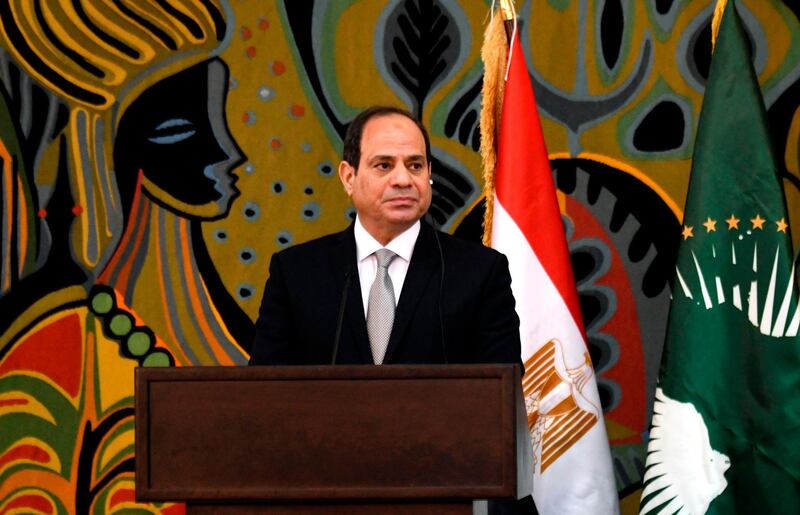Egypt's parliament will on Tuesday start debating constitutional amendments that could allow its president to stay in office until 2030 and give the military a supreme political role.
Promoted as a popular demand to reform the political system, the amendments were adopted on Sunday by the house's legislative and constitutional committee.
A house vote is certain to approve the changes because supporters of Abdel Fattah El Sisi, the country's general-turned-president, comprise the overwhelming majority of its 596 members.
Once adopted by the house of representatives in a vote expected before the end of the week, Egypt's estimated 60 million voters will be asked to vote on the changes in a referendum.
That vote will probably be held before the start of Ramadan in early May.
Under protocol, Mr El Sisi has been publicly silent on changing the constitution, a progressive document overwhelmingly ratified in a 2014 vote.
But plastering Cairo and other cities with thousands of billboards urging Egyptians to vote "yes" to the changes before Parliament's vote on the amendments has left many convinced that the outcome of the process has been a foregone conclusion.
Throughout the process, which began in February, Parliamentary Speaker Ali Abdel Aal has emerged as the strongest and most vocal proponent of the changes.
Mr Abdel Aal has consistently defended them from criticism by the weak and fractured opposition and tirelessly explained them as necessary for reforming the country's political system.
A constitutional expert, he has also done the most to shoot down any suggestion that the changes amount to a thinly veiled power grab.
The proposed changes would extend presidential terms from four to six years, but maintain the two-term cap on a serving president.
But they introduce a new clause tailor-made for Mr El Sisi, extending his present four-year term to six years and allowing him to run for another six-year term in 2024.
He was first elected to office in 2014. As defence minister the year before, he led the military's removal of divisive president Mohammed Morsi of the now-outlawed Muslim Brotherhood.
Las year, Mr El Sisi was elected for a second four-year term, running virtually unchallenged after any serious rivals were intimidated into withdrawing or jailed on criminal charges.
At the end, his sole rival was an obscure politician widely believed to be among his supporters.
Mr Abdel Aal has said that the Egyptian leader was not keen on remaining in power and that the presidency had nothing to do with the process of changing the constitution.
He also defended the premature appearance of the street "vote yes" promotions, saying it was the work of private citizens, not the authorities.
Mr El Sisi has done so much for Egypt that he deserves more time to transform the country into a modern state, Mr Abdel Aal and other supporters say.
The original proposals stipulated that Mr El Sisi could finish his current term as planned in 2022, but would be eligible to run for two more, six-year terms, giving him a chance at 20 years in office, ending in 2034, when he would be about 80.
The latest proposal to limit the president to a further term is evidence that the process of debating the amendments was never a formality, Mr Mr Abdel Aal said.
Other changes approved by the house's legislative and constitutional committee include creating a vice presidential role and a 180-seat upper house in parliament.
They provide for a 25 per cent quota for women in Parliament and "suitable" representation in the chamber for Egyptian expatriates, minorities and people with special needs.
They proposed amendments giving Mr El Sisi more control over the judiciary, allowing him to appoint top judges and chair a new body to run the affairs of the judiciary.
Mr El Sisi has made the economy and security top priorities of his rule, stepping up the fight against insurgents on the Sinai Peninsula and overhauling the economy with ambitious reforms that have improved economic indicators but deepened the struggle of the country's poor majority to make ends meet.
At the same time, he has overseen one of the harshest and largest crackdowns on dissent in Egypt's modern history, jailing thousands while suppressing freedom and restricting rights groups.







